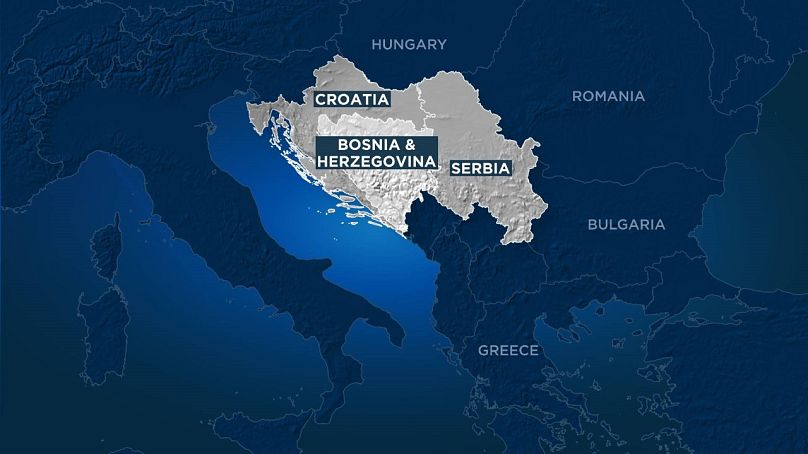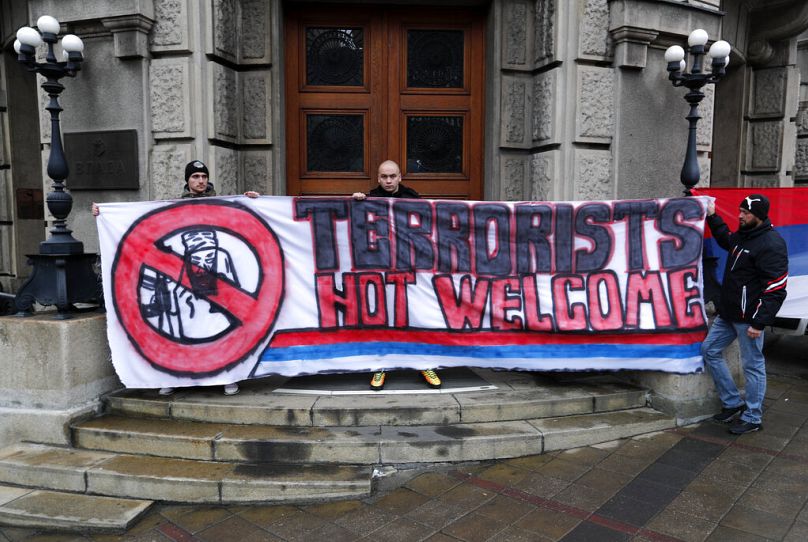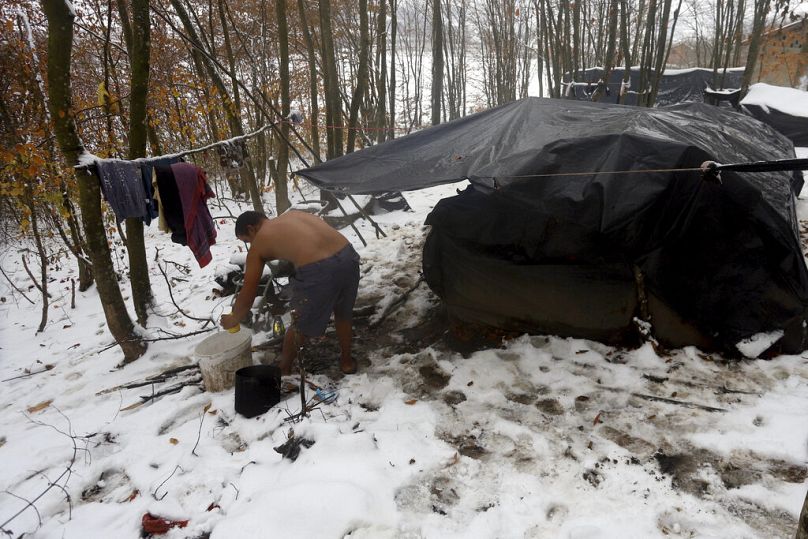Thousands are camped near the Bosnia/Croatia border as sub-zero temperatures sweep in ahead of winter.
More than three-quarters of a million migrants poured through the Western Balkans at the height of Europe's refugee crisis in 2015.
Five years on, the numbers in countries like Bosnia and Serbia are a tiny fraction of that.
But winter, COVID-19 and border restrictions are combining to trap migrants in awful conditions on the doorstep of the European Union.
Thousands are camped on the Bosnia/Croatia border with limited options. Make a break for the EU and they face the threat of violence at the frontier or go back to cities such as Belgrade where anti-migrant vigilante groups are reportedly on the rise.
Here, to mark International Migrants Day, we take a deeper look at the migrant situation in the Western Balkans.
The rise of vigilante groups in Serbia
Serbia is home to around 6,000 migrants and refugees, most of them in reception centres and hoping to get into the EU.
The country was considered a safe haven for migrants and a final stop-off point for those heading to Bosnia and Croatia.
But the country's climate is changing towards migrants, according to Danilo Curcic, from human rights NGO The A11 Initiative.
He said police were racially profiling migrants and refugees on the streets of the Serbian capital Belgrade.
Curcic also warned about the rise of vigilante groups in Serbia that have allegedly been chasing migrants and refugees.
“Far-right group Leviathan recently published a video in which they caught some refugees and escorted them from Belgrade," he said.
"It is very disturbing but also [the] silence of the police and the authorities regarding these incidents speaks a lot about their acceptance of this kind of behaviour.”
"UNHCR [UN's refugee agency] is very concerned about the rise of anti-refugees-migrants rhetoric," a spokesman for UNHCR Serbia told Euronews.
"This is a trend that has been going on for a while, but not just in Serbia but in the other countries as well. Part of the answer can be found in all the challenges brought on by this very moment - the entire planet has been paralysed by the pandemic.
"The measures introduced to prevent the spreading of the virus have already taken their toll – economically and psychologically. When faced with looming insecurities, people tend to search for answers and explanations, and it is easier for them to identify someone to blame for the unpleasant situation.
"In such an oversimplified picture of reality, the most vulnerable groups - refugees and migrants in this case - can become an easy target."
The vast majority of refugees and migrants pass through Serbia on their way to Bosnia or an attempt to enter the EU directly via Croatia, Hungary or Romania.
One of the few to stay in Serbia is Karox Pishtewan, 19, from Iraq. He arrived in the country three years ago as an unaccompanied child migrant. He has just got his Serbian passport.
“I tried to enter [the EU] via Romania but I was caught up and beaten by the police," he told Euronews. "My private possessions were taken from me. I never tried again to go into the 'game', so I stayed here.”
The "game" is a term used by refugees and migrants for crossing the border into the EU without the help of smugglers.
Pishtewan is currently working as a translator since his Serbian is excellent. But he wants to take a new career path.
“I want to open my own hair salon," he said. "Since I like the mentality of people here, it is similar to what I am used to and to go to [the] EU is impossible, I want to start my life here."
Violence and pushbacks on the border with Croatia
For some, the chosen route into the EU is via Croatia.
But migrants and refugees crossing into the country are facing violence and being pushed back into Bosnia or Serbia.
“When ‘caught’ at the green borders, as the official borders are sealed and inaccessible, they are usually denied asylum, physically abused, emotionally threatened, with their possessions taken away, and kicked out, that is pushed back to Serbia and Bosnia”, said Emina Buzinkic, an activist with the Transbalkan Solidarity Group and former president of Croatia's Council for Civil Society Development.
Buzinkic added that pushbacks are not only happening at the Croatia-Serbia or Croatia-Bosnia border but all the way from Germany, Austria and Hungary.
She says refugees and migrants are facing numerous problems along the Balkan route.
“From confinement in the camps amid the pandemic with no access to soap and hot water to abuse by security guards, lack of nutritious food, violence among migrants themselves caused by the horrific conditions, protracted uncertainty and the number of people being thrown to the streets and woods with no support."
'Migrants will die in Bosnia if nothing is done'
There are around 4,700 migrants and refugees on the Bosnia-Croatia border, according to the International Organization for Migration (IOM).
Around 1,500 people of them are facing spending Christmas Day camping out in sub-zero conditions near the frontier.
Peter Van Der Auweraert, IOM's representative in Bosnia and Herzegovina, told Euronews he feared people would die if nothing was done.
He said there are a further 1,400 migrants in the Lipa camp in the northwest of the country, which has been much criticised for its substandard conditions.
"We are obviously very concerned and we are increasing humanitarian assistance to them (blankets, food parcels etc) but it's like putting a band-aid plaster: if someone is bleeding badly it's not going to be much help," he said.
Van Der Auweraert said authorities had failed to connect running water or electricity and that the camp would be closed down shortly.
Ahmad, who says he's from Afghanistan, is one of those with experience of the situation on the Bosnia-Croatia border.
The 19-year-old, speaking to Euronews at a former railway station in Belgrade, said he's waiting for the right opportunity to cross into Bosnia and from there, Croatia and onto Germany.
“It is not [the] right time to cross over [due to] bad weather but maybe the police will not be so vigilant.
"I was in Bosnia and conditions are horrible in the camps, squats or forest. But what I am going to do [heading for Germany] there is no coming back for me,” he said.
Ahmad said he has heard from other refugees about vigilante groups in Belgrade but did not have experience with them so far.
“I hope I will not meet them," he said. "What we can do against them? To who to report them? They are from Serbia. I would prefer to take a chance with 'the game'," he concluded.
Euronews contacted Serbia's interior ministry to comment on this article but it had not responded by the time of publication.
Every weekday at 1900 CET, Uncovering Europe brings you a European story that goes beyond the headlines. Download the Euronews app to get an alert for this and other breaking news. It's available on Apple and Android devices.














